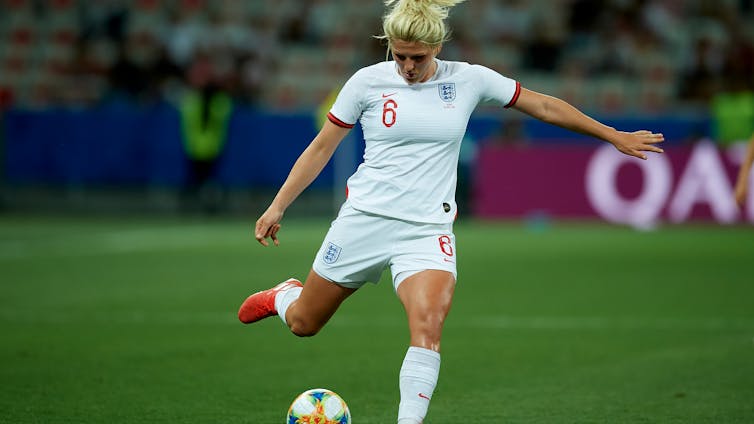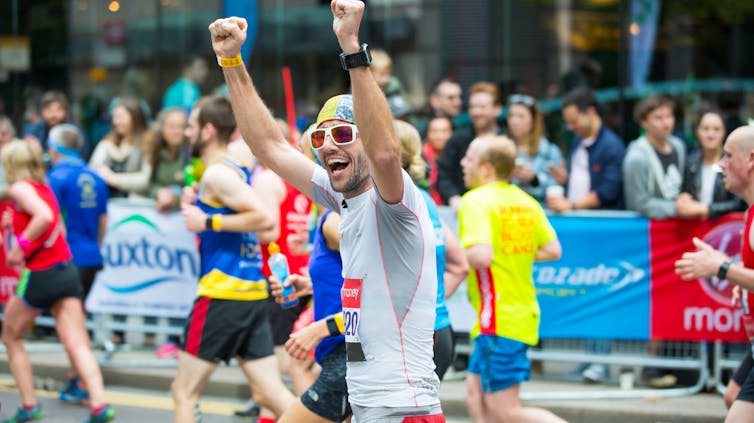By Helen Owton
Originally published on OpenLearn
Keely Hodgkinson’s triumph as the 2024 BBC Sports Personality of the Year underscores the compelling nature of women’s sports. Her exceptional achievements, most notably clinching the Olympic 800m gold medal in athletics, have captivated audiences and demonstrated the high level of talent and dedication present in women’s athletics. Hodgkinson’s success not only elevates her sport but also inspires a new generation of athletes and fans, reinforcing the significance and excitement of women’s sports on the global stage . Here’s why women’s sport not only deserves your attention but also enriches the sports world.
 Keely Hodgkinson
Keely Hodgkinson
Once relegated to the sidelines of mainstream attention, women’s competitions are now commanding global audiences, filling stadiums, and shattering records across the sporting world. Gone are the days when women’s sports were unfairly criticised for being ‘less exciting’ or ‘less competitive’ than men’s sports. The past decade has proven that female athletes are just as capable of delivering awe-inspiring performances. This surge in popularity makes 2025 an exhilarating time for fans and a critical moment in the history of women’s sport.
Take women’s football, for instance. The Women’s World Cup 2023 was a watershed moment, breaking attendance records and drawing over two billion viewers worldwide. Players like Alexia Putellas and Sam Kerr captivated audiences with their technical brilliance. Again, thus proving that women’s football offers just as much – if not more – flair and unpredictability as the men’s game . Similarly, the WNBA has reached new heights, with stars like A’ja Wilson redefining basketball excellence and viewership surging by 40% over the past two years, massively snowballing revenues.
 Alexia Putellas
Alexia Putellas
Pushing through the speed barrier
Susie Wolff has played a pivotal role in advancing the achievements of women in motorsports by paving the way in her achievements and creating the conditions through her role as Managing Director in the F1 Academy. For example, Abbi Pulling dominated the F1 Academy season , clinching the title with 9 wins and 14 podiums, and has set her sights on the 2025 British GB3 Championship. Bianca Bustamante made history as the first female in McLaren’s Driver Development Programme. These achievements underscore the growing impact of women in motorsport, and justify the increasing prize funds for 2025 .
In Motorcycling, the Fédération Internationale de Motocyclisme (FIM) launched the inaugural Women’s Circuit Racing World Championship , marking the first global platform exclusively for female riders.
Women’s sport often emphasises technical skill, strategic gameplay, and creativity, offering a fresh perspective compared to the power-driven approach that dominates some men’s leagues. For fans who value a balance of finesse, athleticism and heart, women’s competitions are unmissable. Women’s sports stories can go beyond the action on the field – they tell stories of resilience, empowerment and progress. Female athletes are often trailblazers, breaking barriers in traditionally male-dominated spaces. Watching women’s sports isn’t just entertainment, it’s witnessing history in the making. As well as Keely Hodgkinson’s accomplishments in athletics which have garnered widespread recognition, highlighting her as a leading figure in women’s sports, there are many athletes who have not only excelled in their respective sports but have also played pivotal roles in advancing women’s athletics on a global scale.
Trailblazing women in 2024
Coco Gauff’s meteoric rise from teenage prodigy to Grand Slam champion symbolises the next generation of unstoppable female athletes.
 Coco Gauff
Coco Gauff
Simone Biles : Recognised as Sports Illustrated’s 2024 Sportsperson of the Year, Biles’s exceptional performances at the Paris Olympics 2024 have further solidified her status as a gymnastics icon.
Caitlin Clark : The WNBA star has made a remarkable impact in her rookie season, showcasing outstanding skill and contributing to the growing popularity of women’s basketball. Awarded Athlete of the Year 2024 by Time.
Napheesa Collier : Beyond her on-court achievements, Collier co-founded ‘Unrivaled’, a three-on-three basketball league aimed at providing WNBA players with domestic opportunities during the off-season, reflecting her commitment to advancing women’s basketball.
Arisa Trew : Became the first female skateboarder to land a 900 in a half-pipe, achieving this feat on 29 May 2024.
Watch the following video on top stories about women trailblazers in 2024 .
Women also achieved remarkable milestones in adventure and exploration, breaking barriers and inspiring future generations:
Cole Brauer : Became the first American woman to sail solo, nonstop, and unassisted around the world, completing her journey in March 2024.
Cathy Babis : Achieved the first solo circumnavigation of Australia in a seaplane, showcasing exceptional skill and determination.
Annie Wilmot and team : Alongside Olivia Price, Laura Harding and Lisa Darmanin, Wilmot made history as part of the first Australian team to compete in the inaugural Women’s America’s Cup, marking a significant step toward gender equality in competitive sailing.
Shanda Hill : On 12 October 2024, Hill became the first woman to complete the Triple Deca Ultra Triathlon, demonstrating extraordinary endurance and resilience.
These pioneering women have expanded the horizons of adventure and exploration and can inspire others to pursue their passions and challenge the limits of possibility. These narratives inspire not just young girls but everyone who believes in overcoming adversity. The visibility of women excelling at the highest level motivates future generations, creating a virtuous cycle of inclusion and participation in sport.
Putting their money where their mouth is
Indeed, one of the most compelling reasons to support women’s sports is the direct impact of increased investment. Broadcasters, sponsors, and leagues are finally putting their money where their mouth is, leading to better facilities, higher salaries, and improved competition. For example, Barclays’ sponsorship of the Women’s Super League (WSL) in England and Visa’s partnership with UEFA Women’s Football have helped professionalise the sport, making it more competitive and attractive to fans . With higher production values and more accessible broadcasts, watching women’s games is becoming easier and more engaging. The return on investment is demonstrated in the Nielsen study (2018) which found that 84% of sports fans globally are interested in women’s sports , and corporate sponsors are taking note. This growth benefits fans, too, as it leads to more thrilling games, tighter rivalries, and unforgettable moments.
Tuning into women’s sport in 2025
Women’s sports are no longer a ‘niche’ offering – they are central to the future of sports entertainment. With record-breaking attendance figures and growing global fan bases, it’s clear that the appetite for women’s competitions is only increasing . From the electric atmosphere at the Women’s Rugby World Cup to the record-smashing viewership of the NCAA Women’s Basketball Final Four, women’s sports consistently deliver high-stakes drama and unforgettable moments. Major networks and streaming platforms have also embraced women’s sports, ensuring that fans have more opportunities than ever to watch and support their favourite teams .
In 2025, the question shouldn’t be why women’s sports are worth watching – it should be ‘Why aren’t you watching already?’ Female athletes are delivering performances that rival and often surpass their male counterparts, all while championing progress and inspiring millions.
By tuning in, you’re not just supporting incredible talent – you’re also contributing to a movement that is redefining the future of sports. Whether you’re a lifelong fan or a newcomer, now is the perfect time to join the wave and experience the magic of women’s sports.
The year 2025 is set to be another landmark year for women’s sports, featuring a diverse array of high-profile events across multiple disciplines. Here’s a guide to some of the most anticipated competitions you can look forward to:
Dates to watch out for in 2025!
TENNIS
Grand Slam Tournaments: 12 January
The Australian Open begins on 12 January, with British number one Katie Boulter set to compete. Subsequent Grand Slam events include the French Open, Wimbledon, and the US Open, each offering thrilling matches featuring the world’s elite female players.
Get started with the Australian Open matches schedule .
BASKETBALL
Unrivaled Basketball League: 17 January
This new women’s 3-on-3 basketball league, founded by US Olympians Napheesa Collier and Breanna Stewart, features stars like Angel Reese and Sabrina Ionescu. Notably, tennis star Coco Gauff has invested in the league, underscoring the growing support for women’s basketball.
Unrivalled Basketball League Schedule .
NETBALL
Vitality Netball Nations Cup 2025: 1–9 February
This tournament will see England’s Vitality Roses compete against Malawi, South Africa, and Uganda. Matches are set to take place in Nottingham and London .
Netball Super Cup (NSL): 8 March
This new one-day competition is to be held at the Utilita Arena Sheffield . All eight teams from the relaunched Netball Super League will participate, offering fans a chance to see new squads in action.
FOOTBALL (SOCCER)
2025 UEFA Women’s Nation League: 21 February
The second UEFA Women’s Nation League begins in February. England and Scotland have qualified in different groups and on 26 February England will be hosting their game against Spain (holders) at Wembley .
National Women’s Soccer League (NWSL): 7 March
The 2025 season kicks off on March 7 with the Challenge Cup in Orlando, Florida, featuring 190 matches culminating in an eight-team playoff in the fall.
UEFA Women’s Euro 2025: 2–27 July
Scheduled from 2–27 July in Switzerland, this tournament will showcase Europe’s top national teams competing for continental supremacy. Here’s all you need to know .
GOLF
Women’s Major Championships: 29 May–1 June
The 2025 schedule includes the US Women’s Open at Erin Hills in Wisconsin, followed by other major tournaments that will feature the top female golfers competing on challenging courses.
When and where .
RUGBY
Women’s Rugby World Cup: 22–27 August
Hosted by England, this premier event will bring together the world’s best women’s rugby teams, promising intense matches and showcasing the sport’s growth.
World Cup matches schedule confirmed .
CRICKET
Women’s Cricket World Cup: 1 September
Taking place in India, this tournament will feature top international teams competing for the prestigious title, highlighting the expanding popularity of women’s cricket.
Women’s cricket Calendar
MULTI-SPORT EVENTS
World Games: 7–17 August
In Chengdu, China, the World Games will feature non-Olympic disciplines, providing a stage for diverse sports and showcasing athleticism across various events.
ATHLETICS
World Championships: 13–21 September
Athletes will compete in both indoor and outdoor World Athletics Championships , with the indoor event in Nanjing, China, and the outdoor championships in Tokyo, Japan, offering a platform for record-breaking performances.
And finally…
It has recently been announced that Kelly Cates and Gabby Logan will be joining Mark Chapman as the new presenters of iconic BBC football show Match of the Day , replacing Gary Lineker. It will be great to see two experienced and talented female presenters front a high-profile sporting TV programme.

![]()




















